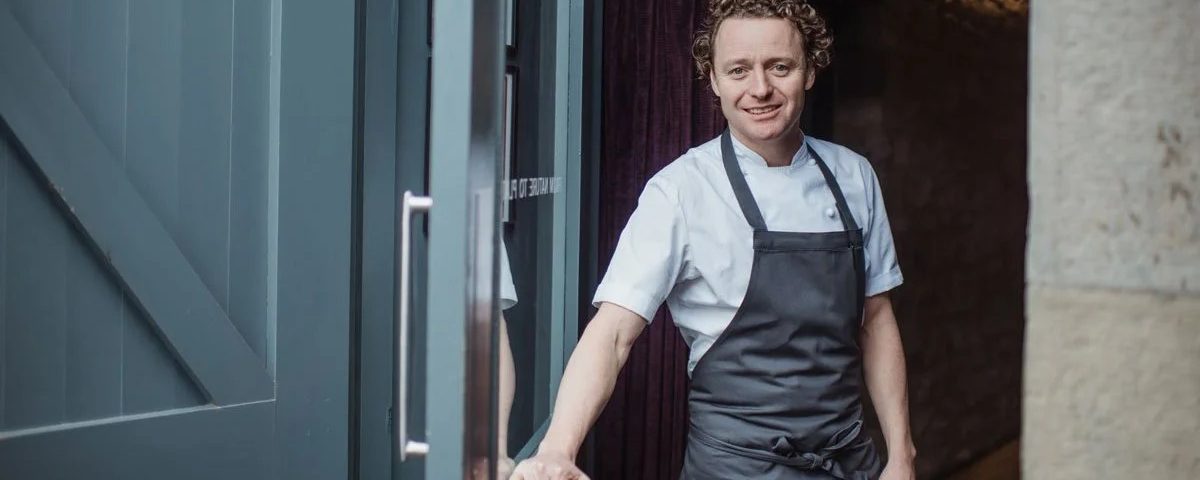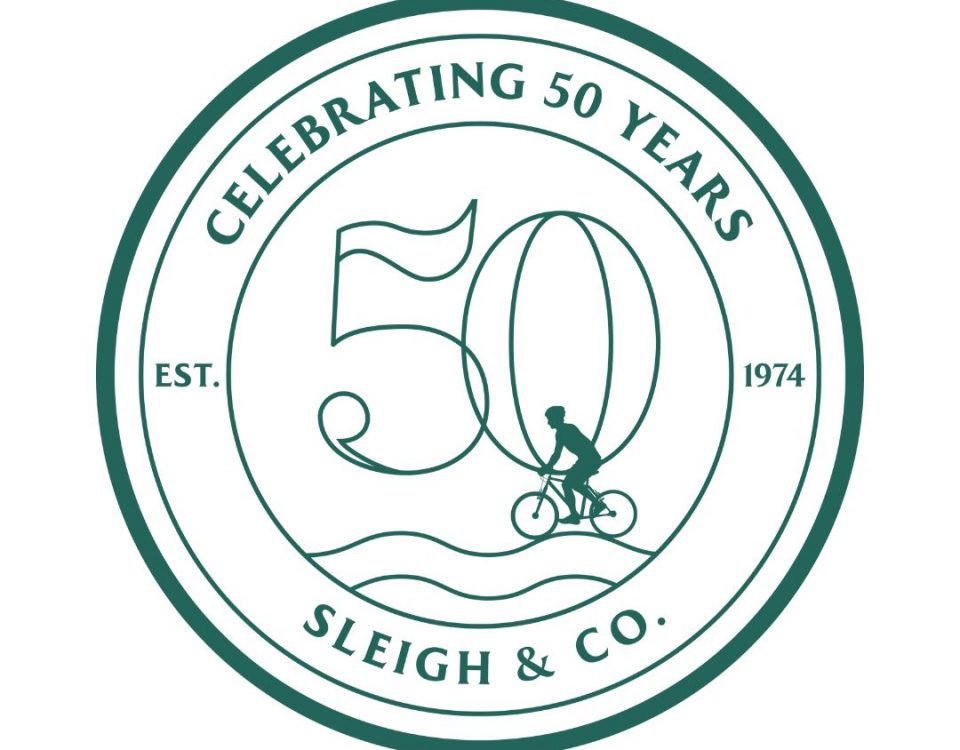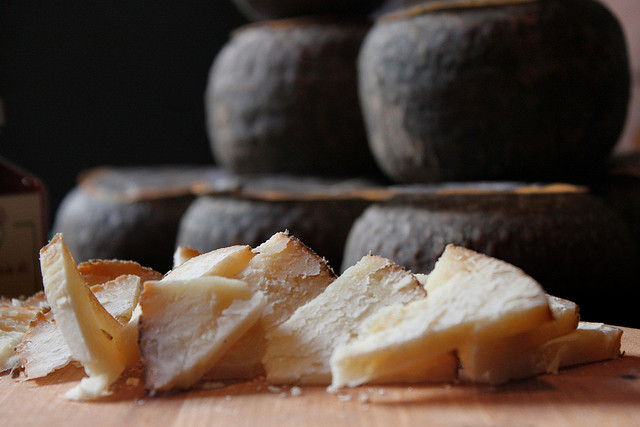From Leith to the World: Tom Kitchin on Scotland’s Ingredients, Seasons and Stories
Where French Training Meets Scottish Passion
How Tom Kitchin learnt that cooking from the heart means celebrating the hero ingredient above all else
At the entrance of a former whisky bond warehouse in Leith, the past lingers in the arches and stone. Once a hub of trade where barrels rolled from horse and cart to ship, today this historic site is home to one of Scotland’s most celebrated culinary voices: Tom Kitchin. “When we started here almost 20 years ago, this was all we could afford,” he says with a grin. “Leith had an edge back then. People think it’s glamorous now, but back then it was still Trainspotting territory. We liked that, and we’ve been proud of our Leith roots ever since.”
When the Sleigh’s team met Kitchin at The Kitchin before opening, the first thing we were struck by was the warmth of the space. It wasn’t just that it was one of the hottest days of summer; it was the atmosphere and nature of the restaurant that he cultivates. Chefs passed through the space with a smile and a wave. Passers-by who stopped in asking about a reservation or a voucher were immediately attended to by Kitchin himself.
Kitchin’s flagship restaurant has become synonymous with the phrase he has carried like a mantra: “From Nature to Plate.” More than a slogan, it’s a philosophy rooted in two worlds, the French gastronomic tradition that shaped him, and the Scottish land and sea that continue to inspire him.
This philosophy didn’t emerge overnight. It was forged in the demanding kitchens of France, where a young Scottish chef learned that cooking with your region, la cuisine du terroir, isn’t just technique, it’s reverence. Under the tutelage of gastronomic giant Pierre Koffmann, Kitchin discovered that true cooking comes from the heart, not from what guests expect.
“Cooking with the seasons isn’t something new,” he reflects. “I learned it from mentors like Pierre Koffmann, where everything started with the market, what was fresh that morning. Back in France, food was a religion, a way of life. I brought that lesson back with me to Scotland.” This focus on ingredients led him to see his homeland through different eyes, and inspired him to return to his roots to open his first restaurant.
But it wasn’t an easy beginning when he and Michaela opened the doors to The Kitchin. “My wife and I borrowed from whoever we could. There were two of us in the kitchen, three in the front of house, and twenty bottles of wine on the list. It was humble, but we held on to that philosophy: cook local, cook seasonal. Nineteen years later, that’s never changed.”
The Hero on the Plate
If, for Kitchin, Scotland itself is the grand stage, then its ingredients are the heroes. “When you look at my menu, you should know instantly who the star is,” he says. “It might be turbot, lobster or grouse, but it’s the ingredient that leads. My job is not to overcomplicate or deconstruct, but to let nature speak.”
This respect for produce comes alive in small seasonal rituals. On the 12th of August, known in Scotland as the Glorious Twelfth, the very first grouse of the shooting season arrive at the restaurant. “The gamekeepers bring them straight in, and they’re on the menu that night. That’s how close the connection is between land and plate.” In summer, it might be mackerel, one of Scotland’s cheapest fish, yet in Kitchin’s eyes one of the very best. Come autumn, mushrooms and wild duck take centre stage. By winter, he is already dreaming of the first green asparagus shoots of spring.
His excitement is childlike, but his reverence is serious. Kitchin speaks passionately to his young chefs about looking beyond their phones, beyond their immediate environment, to truly comprehend what it takes to bring that hero ingredient to the plate. “I tell the young chefs all the time, you need to think about the fisherman who caught that fish, how it was handled, how difficult it was to source. Our role is to treat [the ingredients] with respect.” Each element of the chain matters, because once the produce arrives at the restaurant, it becomes the team’s turn to honour what nature and skilled hands have provided.
The relationship with suppliers runs deeper than mere transactions. These are partnerships built on mutual respect and shared passion. His suppliers understand that The Kitchin only accepts the best ingredients, and Kitchin works with each supplier, adjusting his menu to meet nature’s bounty. When the fish merchant arrives with something exceptional that wasn’t on the order, the menu shifts. When the gamekeeper calls about particularly fine venison, plans change. This flexibility, this willingness to let ingredients lead, creates menus that truly reflect Scotland’s seasonal bounty. It’s this reverence that makes dining at The Kitchin feel less like a meal and more like a celebration of place.
Leith as Home and Destination
As much as the Kitchin’s story is about ingredients, it is also about place. Leith, once the scrappy port district of Edinburgh, has transformed into a destination in its own right, in no small part due to pioneers like Kitchin. “When you’re young, you think new restaurants are competition. Now I see it differently. The better places, the better for everyone. Leith has become a destination, a community of its own.”
He rattles off his favourites: oysters at Ship on the Shore, the traditional fiddles that sometimes spill out of Shore Bar, and the quiet escape of Cramond village, a short drive away. “Sometimes the best thing you can do in Edinburgh is walk the shoreline, grab some fish or oysters, and just feel like you’ve encountered the real place.”
For Sleigh’s clients looking for a Kitchin-approved recommendation, beyond his own restaurants, of course, he suggests L’escargot Bleu, one of the city’s beloved French establishments. Here, head chef Fred Berkmiller prepares Scottish ingredients in traditional French style, not dissimilar to Kitchin himself. “He’s a pioneer. What he’s doing sometimes goes under the radar… but he’s dedicated his life to food and gastronomy.” Not one to miss the next time you’re in Edinburgh!
Family, Philosophy, Future
The Kitchin business today extends beyond fine dining, with gastropubs The Scran & Scallie and The Bonnie Badger rounding out the family portfolio, but the driving force remains personal. “When our eldest was born, my wife was still taking reservations,” he laughs. “Now he’s 17 and working in the restaurant, carrying trays. All of our kids have been involved, whether over school holidays or in the day-to-day life. The team we work with here. They’re treated like family too.”
It is special to Kitchin, and we can only assume to his wider team, that his children know every member of the kitchen teams across his establishments. They share their opinions, influencing what style of chips are on the Scran and Scallie menu, sneak wee snacks from the pastry chef, and leave at the end of the day with a fish or steak pie to share over dinner. That, Kitchin says, is “proper family food”.
This grounding, in food, family, and place, is what makes Kitchin not just a chef but also an ambassador for Scotland. Whether serving dinner as part of the Edinburgh Military Tattoo celebrations or introducing Scottish produce to international guests on journeys like the Royal Scotsman train, he recognises the role food plays in cultural connection. “People come to Scotland with a dream. Our job is to make sure they leave saying ‘wow’. And then they tell as many people as possible.”
Looking ahead, Kitchin seems less concerned with what comes next for him personally, and more with what endures. Younger chefs, a new generation of suppliers, and Scotland’s natural rhythm of seasons all inform a philosophy that is more stewardship than innovation. “Ingredients might arrive earlier now because of the climate, but nature still has the final say,” he muses. “Our job is to listen.”
At the end of the day, Kitchin’s food is simple in intention yet deeply layered in meaning: to respect what Scotland gives, and to tell its story on the plate. “The clients you bring here,” he says, nodding to Sleigh’s team, “they connect with the castles, the landscapes, the golf, the Tattoo. But when they taste Scotland too, the game, the seafood, the whisky, then they carry the whole story home with them.”
In Kitchin’s hands, Scottish produce becomes more than sustenance – it becomes storytelling, cultural preservation, and celebration of place all served on a single plate. This is Scottish dining at its most essential: rooted in tradition, elevated by skill, and always, always led by the hero ingredient that makes it all possible.
Ready to experience Scotland’s culinary heritage for yourself? Contact us enquiries@wlsleigh.co.uk







